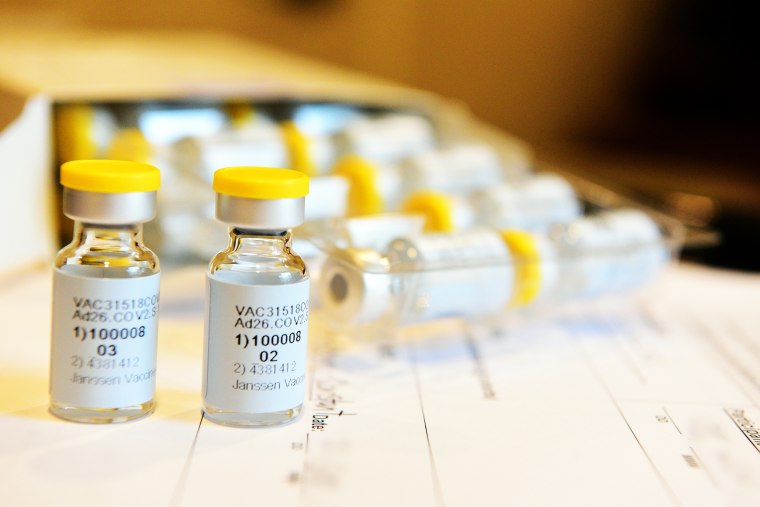With the first shipments of Johnson & Johnson's Covid-19 vaccine expected as early as next week, Biden administration officials are prepping a campaign to send the message that it provides good protection against the virus and that, just like the two other major vaccines, it will be distributed equally among all communities in the U.S.
"Next week will be a big moment," an official said, saying reaching herd immunity in the U.S. by the summer depends on the successful rollout of a third major vaccine.
"We want to be super, super clear about effectiveness and the fact that every community is going to have access to every vaccine to beat back on any misinformation that any community is going to get a lesser one," the official said.
The strategy is to blunt concern that the Johnson & Johnson vaccine is slightly less effective than vaccines produced by Pfizer-BioNTech and Moderna and that because of that, it might be used more in underserved communities, officials said.
Some administration Covid-19 advisers are circulating talking points to medical surrogates and allies that include data tables demonstrating that all of the vaccines in the pipeline have shown "dramatic decrease in severe illness," according to a slide obtained by NBC News.
"Every vaccine that has published data shows NO cases of hospitalization among those who were vaccinated," the table says.
Documents released Wednesday by the Food and Drug Administration indicate that the Johnson & Johnson vaccine is overall safe and highly effective against serious illness, at 86 percent. Globally, however, the vaccine's effectiveness against moderate to severe disease was less, 66 percent, because it was tested in areas where more variants of the virus were circulating. In the U.S., the vaccine was found to be 72 percent effective against moderate to severe illness.
Some state health officials are concerned that people will show up to mass vaccination sites demanding a certain vaccine over another, according to the Association of State and Territorial Health Officials.
The challenge for the government will be to explain that people shouldn't feel cheated if they get the Johnson & Johnson vaccine, because, even though its trials demonstrated slightly less efficacy, it will still provide strong protection against severe disease, death and complications from the variants, said Dr. Kavita Patel, a primary care physician who was a policy aide in the Obama administration.
"They're really worried," she said. "The White House is trying to make sure we're not creating a false narrative about these efficacy rates — because the goal is to make clear anybody who's taken any of these vaccines has not been hospitalized, not died from Covid or from any of these vaccines," Patel said.
Dr. Mark McClellan, a former FDA commissioner who serves on the board of Johnson & Johnson, said there should be unified and consistent messaging about the breakthrough in preventing major illness and death. Marcus Plescia, chief medical officer of the health officials organization, even tweeted Wednesday that he prefers the Johnson & Johnson vaccine.
The Johnson & Johnson vaccine is administered as a single dose and can be stored at standard refrigerator temperatures for three months, compared to the vaccines produced by Pfizer and Moderna, which require two doses and ultracold storage.
It is also made differently. It uses an inactivated virus, called an adenovirus, to teach the body's immune system to recognize and fight off SARS-CoV-2, the virus that causes Covid-19. The vaccines made by Pfizer-BioNTech and Moderna rely on a different technology, using genetic material called messenger RNA, or mRNA.
Before the favorable review, another official close to the administration said some local governments had been debating the ethics of distributing the vaccine in communities that might be less likely to show up for second doses.
McClellan said that whether it's because they're hard to reach, hard to track or just in need of quick immunity, certain populations could make better candidates for single-shot vaccines.
"There's been a lot of discussions about, because of the profile being single-dose, that the populations where it's directed might be different," he said, citing teachers; people who might be hard to track over time, including migrant workers and homeless people; and "younger people who might have a more difficult time coming back."
"There are lots of different groups where the different features might be advantageous. I do think there's going to be a lot of discussion of that," he said.
Patel said, "I actually think this is a great vaccine for young people who think they're invincible and tend to not use health care that much." The same goes for "populations that tend to fall off," like homeless people. "But I've warned you can't have it perceived the inferior vaccine is going to poor people," she said.
Johnson & Johnson said that, assuming the FDA authorizes its vaccine for emergency use, it would be able to provide 20 million shots by the end of next month and 100 million more doses over the summer.
The White House official stressed that the government plans, once the Johnson & Johnson vaccine gets final approval, to ship it in the "exact same way and proportionally" to the others. "What you will hear us say is 'every vaccine for every community,'" the official said.
According to experts, whether Johnson & Johnson is deployed differently from the Moderna and Pfizer vaccines is ultimately likely to be a state-level decision.
"It would be very hard to pinpoint this vaccine," said Dr. Josh Sharfstein, a former FDA deputy commissioner. "People will have the ability to say, 'We're setting up a clinic for the Johnson & Johnson vaccine, and it offers milder side effects and pretty good protection,'" so come and get it, he said.
McClellan said that "if things go well," the U.S. could move past the pandemic "fairly quickly," possibly as early as summer.



